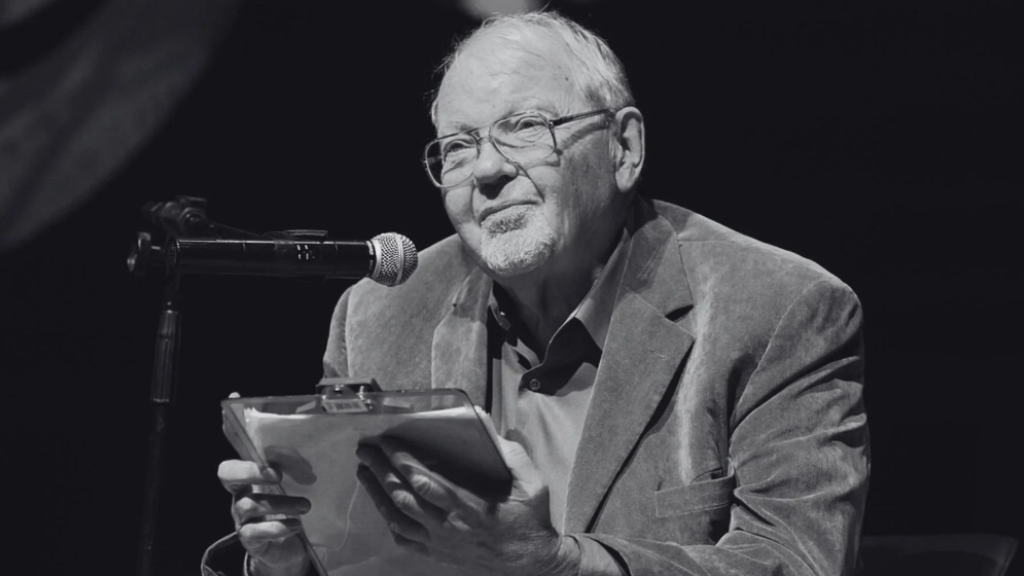REST IN POWER
Boris Kagarlitsky: Obituary for Fredric Jameson (1934-2024)

[Editor's note: Marxist sociologist Boris Kagarlitsky is currently in a Russian prison for speaking out against the full-scale invasion of Ukraine. In support of his release, the Boris Kagarlitsky International Solidarity Campaign is hosting an online conference on October 8, “ Boris Kagarlitsky and the challenges of the left today”. LINKS International Journal of Socialist Renewal is proud to be a co-sponsor and encourages all readers to register for the conference.]
First published in Russian at Rabkor. Translation by Dmitry Pozhidaev for LINKS International Journal of Socialist Renewal.
While in prison, I have received several messages regarding the passing of colleagues. And now, news has arrived about the death of Fredric Jameson, the author of seminal works on the culture of late capitalism. He was one of the first to discuss postmodernism in philosophy and politics, showing the connection between intellectual reflections, changes in the discourse of political figures, and structural shifts in society. I obviously lack access to materials here in penal colony No. 4 to write a comprehensive article about Jameson’s ideas, his contribution to the development of social sciences and Marxist theory. And to be honest, I would rather talk about something else — Jameson was never a dry theorist or a boring academic, even though he worked in a university setting and had many students.
I met him in the 1990s during my first trip to the United States. Fred was one of the people who helped organise the trip, and very soon, after a few days spent in Madison, Wisconsin, with another remarkable sociologist — Erik Olin Wright — I moved south to Duke University in North Carolina, where Jameson was teaching. Embarrassingly, I had not yet read his works at that time. My excuse was that it was still the Soviet era, and access to foreign books was quite difficult, despite the political changes that had already taken place. Perestroika had not yet run its course in our country, while in the US, they were just beginning to understand the consequences of the neoliberal reforms (or rather, counter-reforms) implemented by [then-president] Ronald Reagan.
Jameson immediately struck me as being completely different from most Western intellectuals, including leftists, with whom I had become acquainted by that time. He seemed like a simple, down-to-earth guy, a real Southerner (at least, that is how he appeared to me), a lover of beer and greasy food, a cheerful fat man from whom you would least expect deep thoughts about aesthetics and philosophy or refined political analysis. But those were precisely the kinds of conversations we had. What worried Fred the most was the influence of eclectic postmodernist thinking on the left and Marxism. His main adversaries were Chantal Mouffe and Ernesto Laclau, who had just published a book on hegemony. “What kind of hegemony is that without a social subject, without a class conscious of its interests?” Fred thundered. “They’re diluting Gramsci’s theory, stripping it of its substance!”
I did not like Laclau and Mouffe’s book either (I had managed to read it by then), but what particularly impressed me was the passion with which Fred — still a true Southerner — went after his opponents. Later, I got to know Chantal Mouffe, and we had fascinating debates (sometimes agreeing, sometimes radically disagreeing). A while later, I met Fred at another conference and asked him if he had changed his opinion, especially since Mouffe herself, in her later works, seemed to me much more respectful toward Marxist sociology. “No concessions!” Fred thundered again. “It’s just tactics; nothing has fundamentally changed.”
It should be said that Fred, while being an intellectual innovator, at the same time firmly defended classical Marxist approaches (and in doing so, demonstrated their productivity and relevance through his own example).
Here, by the way, I should make a small digression, drawing the reader’s attention to the fact that in the late 20th century — and, I suppose, still today — America unexpectedly became a country where Marxist and, more broadly, leftist thought flourished. Yes, sociologists and political theorists working in the US were cramped in the academic ghetto where they had been confined since the McCarthy-era persecutions of the 1950s. Perhaps only thanks to Bernie Sanders’ 2016 presidential campaign did they manage to break out. For someone as big, vibrant, and loud as Jameson, it must have felt physically stifling. Yet, he spread around him an atmosphere of vitality and optimism, so necessary in our times.
The last time we met was in Moscow. We drank beer and then wine at a Georgian restaurant, and talked about mutual acquaintances and politics, though this time I talked more, trying to explain how the Russian political system and state ideology were structured. “Embodied postmodernism!” Fred exclaimed, half in awe, half in disgust. By then, I had not only read his book on late capitalism but also recommended it to my students.
We did not know that it would be our last meeting in person. Since then, there were international campaigns where our names often appeared side by side. And then Fred helped organise the campaign for my release. Unfortunately, when I am freed, I will not be able to thank him, hear his voice again, or learn from his opinion on the latest pressing issue. As time passes, we all become more isolated, losing beloved conversationalists, teachers, and respected colleagues. And we must rely on ourselves. But we still have students, followers, and comrades. Fred had many of them.
No comments:
Post a Comment